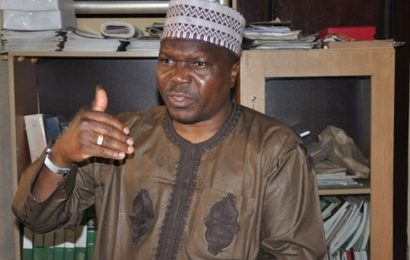

PAPER PRESENTED BY DR MUDA YUSUF AT THE CITY BUSINESS NEWS SUMMIT 2023 HELD ON 8TH NOVEMBER 2023 AT ORIENTAL HOTEL LAGOS
Chairman of this occasion
Barrister Hassan Bello
Lead Consultant, Justicia Consults
Former Chief Executive Officer

Nigeria Shippers Council
Keynote Speaker
Mr. Oscar Onyema, OON
Group Managing Director/CEO
Nigeria Exchange Group Plc
Special Guest
Mrs. Khadijat Ifelola Sheidu-Shabi
Chairperson, Women in Logistics and Transportation
Distinguished Ladies and Gentlemen
I would like to begin by appreciating City Business News for inviting me as Guest speaker at its 2023 summit. I should also commend them for the enormous resources and efforts committed to the organization of this summit. I recognize the Chairman of this occasion, Mr. Hassan Bello; the Keynote speaker, Mr. Oscar Onyema; and our special guest, Mrs. Khadijat Ifelola Sheidu-Shabi. I recognize and welcome all other guests and participants.
The theme of this summit is Repositioning the Nigerian Economy: 2023 and beyond. There is perhaps no better time to have this conversation than now. The dominant worry today among the economic players and the citizens is the health of the Nigerian economy. The anxiety and apprehension are palpable and profound. This is understandable given the economic shocks of the recent months. The experience of economic players and the citizens over the past couple of months has been very unsettling. The shocks are pervasive among the broad spectrum of the business community – micro, small, medium and large enterprises. The informal sector is not spared.
For the citizens, the impact has been very profound amid soaring prices of goods and services, depreciating and volatile exchange rate, illiquidity in the foreign exchange market, high interest rate and high trade costs. There are also worries about weak and declining purchasing power, escalating production costs, rising energy cost, slump in industrial capacity utilization and erosion of profit margins.
Distinguished ladies and gentlemen, this is the current state of play about the concern Nigerian economy. There is therefore a strong case to be made in favour of repositioning the Nigeria economy for recovery and growth, which is the theme of this summit.
CONTEXTUALIZING THE CURRENT ECONOMIC CONDITIONS
Having reviewed the prevailing economic conditions, it is important to give a context to it. The current administration is grappling with a legacy of weak macroeconomic fundamentals – currency volatility, high fiscal deficit, low revenue, surging debt levels, declining reserves and weak investors’ confidence. The evidence of the deteriorating macroeconomic conditions did not fully manifest before the exit of the previous administration. But the reality was that the economy was already on the brink.
The current reforms were designed to correct the legacy of economic distortions and deteriorating macroeconomic fundamentals. Regrettably, however, the reforms had come with enormous pains, especially with regards to the spike in energy costs, acceleration of food inflation to over 30% and surge in transportation cost. But I should quickly add that these reforms were necessary to pull the economy back from the brink. Some of the manifestations of a troubled Nigeria economy were as follows:
Ways and means financing of the federal government operations grew from N2.5 trillion in 2015, to 30.7 trillion in May 2023. This was a jump of over 1000%. This mode of financing deficit is highly inflationary.
The national debt surged form N12.1 trillion in 2015 to N87.4 trillion in July 2023, and increase of over 600%
Exchange rate depreciated from 196 to the dollar in 2015 to 450/$ in 2022 in the official window. It slumped form 230/$ in 2015 to 750/$ in 2022 in the parallel market.
Foreign direct investment contracted by in 2022, indicating an investment flow reversal.
Oil output plunged to 1.2 mbd in 2022, amid the inability to meet the country’s OPEC quota.
Huge maturing forex obligations and backlog running into billions of dollars
Distinguished ladies and gentlemen, these were a few of the underlying factors that make repositioning of the economy imperative. Although the repositioning process has been painful, the reality is that the options are limited.
PATHWAYS TO THE REPOSTIONING OF THE ECONOMY
FUEL SUBSIDY REMOVAL
This reform measure had benefited the economy in the following ways:
Huge savings in government revenue. The FAAC allocation was almost double what it used to be.
Reduced smuggling of petroleum products.
Eradicated the inherent corruption in fuel subsidy.
Reduced domestic consumption from about 65 million litres daily to less than 40 million litres
Outlook for private investment in the downstream is much brighter.
Conservation of foreign exchange as less fuel is imported.
NEGATIVE OUTCOMES
However, we should acknowledge the challenges that followed the fuel subsidy removal.
The increase in PMS price was a huge shock to the economy, investors and the citizens on the back of escalation of energy cost.
Triggered intense inflationary pressures.
Profound adverse impact on the welfare of the citizens – food prices, transportation costs.
Poverty level increased.
Middle class disappearing.
Profit margins of many businesses have been considerably eroded due to high operating costs which are not transferable to consumers.
FOREX RATE UNIFICATION
Another major reform that the Tinubu administration introduced was the convergence of rates between the official forex window and the free market rate. This had also been beneficial in the following ways:
Better transparency
Positive impact on forex liquidity in the short term.
Better prospects for forex inflow.
More revenue for government.
Better prospects for growth of non-oil sector.
DOWNSIDES OF THE FOREX RATE CONVERGENCE
Spirally inflation on the back of sharp depreciation in the naira exchange rate.
Resurgence of speculative pressure on the naira, amid weak external reserves.
Rates began to diverge few weeks after the convergence of rates.
Currency flight to the dollar as store of value.
WAY FORWARD
Investors’ Confidence Building beginning with the clearing of backlog of forex mature obligations
Boosting reserves through enhanced crude oil production.
Deepening of import substitution to ease forex demand pressure, especially with regards to petroleum products importation.
Leverage government assets to enhance inflows through equity investments.
Incentives FDI and FPI flows
Curbing speculative activities through better oversight and surveillance of the deposit money banks.
POWER SECTOR DECENTRALISATION
The decentralization of the power sector by the Tinubu administration was a major policy change.
It opened up the power sector to more private investors.
We should see more mini grids, off grid power solution and less dependence on the central grid.
OTHER PERTINENT ISSUES AID THE REPOSTIONING OF THE ECONOMY
Need to define the limits of market forces in forex and energy pricing.
Palliatives to mitigate the pains of subsidy removal should be policy based and more inclusive
We need to worry more about social outcomes of reforms.
The role of government in infrastructure provision to catalyze economic growth should not be understated.
Need for robust engagement of stakeholders by the minister to enrich the policy process.
OPPORTUNITIES IN THE CURRENT ECONOMIC CRISIS
Incredible opportunities for import substitution across all sectors.
Provision of domestic alternatives to medical tourism
Alternatives to education tourism
Alternatives to vacation abroad.
Alternatives to industrial raw materials
Local fabrications of spare parts and other mechanical devices.
High food prices are a great opportunity for investment in agriculture.
Greater opportunities for export business. $1m is now almost one billion naira. It’s incredible.
Opportunities for diaspora Nigerians to invest at home.
Opportunities for export of services – Japa not entirely a bad idea. India had $100 billion remittances in 2022, Philippines $38 billion; Pakistan $30 billion, Mexico N61 billion , Nigeria $22 billion in 2022.
There should be deliberate policy to promote migration abroad. Even our artisans, care givers, truck drivers can benefit.
Outsourcing opportunities for business abroad.
OPPORTUNITES IN FUEL SUBSIDY REMOVAL
Bigger Investment opportunities in the petroleum refineries and related industries.
Opportunities in renewable energy investment.
Opportunities for private sector importation of petroleum products.
Better focus by investors and households on energy efficiency.
New opportunities in the use of CNG, LPG in transportation.
OPPORTUNITES IN ELECTRICITY SECTOR REFORM
Decentralization opens up opportunities in the entire electricity value chain.
Opportunities investment in embedded power solutions.
Opportunities for investment in mini-grids.
IMPERATIVE OF RESTORING CONFIDENCE IN THE ECONOMY
We need to boost confidence to achieve stability in the economy. We need confidence to boost investment both from domestic investors and foreign investors.
PUBLIC SECTOR MANAGEMENT FRAMEWORK
It is refreshing to see President Tinubu put in place a performance management framework as part of the governance process. This was a laudable development as it would create a culture of result orientation in public service. It would move the disposition of the public sector away from focusing disproportionately on processes to outcomes. If the performance management framework is properly implemented, the economy and the citizens would surely enjoy better value from governance.
I thank you for your kind attention.




